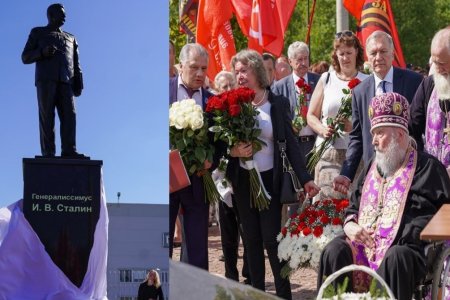
A monument has been erected in Russian-occupied Melitopol (Zaporizhzhia oblast) to Joseph Stalin, the Soviet dictator and mass murderer, responsible for the death of millions of Ukrainians. The monument has a bust of the dictator, with an inscription containing a questionable claim about Stalin’s role in defeating Nazi Germany and the words “from grateful descendants”.
This monstrous desecration of the memory of the Victims of Holodomor, the Deportation of the Crimean Tatar people and the Soviet Terror was, reportedly, initiated by local communist collaborators, but was supported by the Russian occupation ‘city authorities’. A ceremony under the auspices of the communist party of the Russian Federation was held on 8 May at the site of the bust, on the Avenue of Heroes of the Soviet Union. Stalin is claimed to have been “the organizer and inspirer of the Victory of the Soviet people over the German fascist invaders” and is addressed as “Generalissimus of the Soviet Union”. Oleg Slusarenko, described as an MP of Russia’s illegal occupation ‘parliament’ asserted that the unveiling of this monument to Stalin “reinstates truth and justice on our land”.
Such events are always used for propaganda purposes and, especially, the indoctrination of children and young people. Here, local school students were shown being solemnly accepted into the ‘pioneers’ – the Russian invaders’ resurrection of the Soviet organization for ‘communist youth’.
The unveiling of this first monument to the dictator on occupied territory was timed to coincide with the 80th anniversary of Victory Day marked, like in Russia, on 9 May. Russia began using round date anniversaries to justify its ‘rehabilitation’ and mounting glorification of Stalin back in 2015, and has used criminal prosecution and crippling fines against those who tell the truth about Stalin’s collaboration with Nazi Germany and military incompetence. It is now importing such glorification of a mass murderer, and inculcation of historical lies and muffling of the facts to occupied Ukraine.
In 2023, surveys carried out in Ukraine by the Kyiv Independent Institute of Sociology [KIIS], and in Russia (and, possibly, in occupied Crimea) by the independent Russian Levada Centre, found dramatic differences in Ukrainian and Russian attitudes to Stalin.
63% of Russians expressed a positive attitude to Stalin, with 47% stating that they viewed the dictator “with respect”, 9% “positively” and 7% “with admiration”. A mere 8% chose one of the three negative attitudes (“with disliking, irritation” – 4%; “with fear” – 2%; “with revulsion, hatred” – 2%.
Although the number viewing the dictator ‘with respect’ had risen, the overall trend had been evident for many years. In August 2021, the Levada Centre reported that 48% of respondents said that they were in favour of erecting a monument to Stalin. There was an especially sharp increase in the percentage of young people, aged 18-25 approving of such monuments, with this, doubtless, due to the grave distortion of recent history, as well as indoctrination and militarization, in Russian schools. Earlier in 2021, the Levada Centre found that Stalin topped the list of people named among “the ten most outstanding [выдающиеся) figures of all times and nations”. While nobody received an absolute majority, Stalin was noticeably ahead, being named by 39% of the respondents.
It was clear in 2023 that the divide between Russia and (free) Ukraine had deepened even further after Russia’s full-scale invasion of Ukraine, with the difference dure to a sharp increase in the number of Ukrainians who viewed Stalin very negatively. The Kyiv Independent Institute of Sociology noted, however, that the difference had been pronounced since 2012. While Russians’ positive attitude to the murderous dictator had risen from 28% to 63%, Stalin’s ‘popularity rating’ among Ukrainians during this same period had dipped from 23% in 2012 to 4% in 2023.



